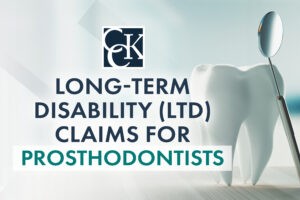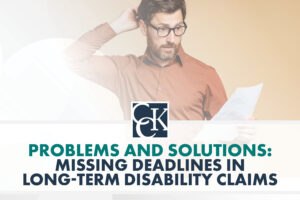Long-Term Disability Lawyer Serving Branchburg, NJ
If you develop a medical condition that prevents you from working, you must consider filing for long-term disability (LTD) benefits. Dealing with the insurance company to receive these benefits adds stress to an already stressful situation. A long-term disability lawyer serving Branchburg, NJ from CCK is ready to assist you.
The LTD process is complex. Claimants want to ensure they receive the disability benefits they need. These benefits can protect a percentage of pre-disability earnings—typically between 60 and 80 percent. The long-term disability attorneys at CCK want to ensure you can focus on your health instead of worrying about obtaining your benefits.
Contacting a Long-Term Disability Lawyer is Beneficial for Your Claim
The disability rate between 2016 and 2020 was 6 percent in Branchburg, NJ. If you live in Branchburg, NJ and develop a disability, you may need to file for LTD benefits.
Some claimants may decide to handle their claims by themselves. While this is possible, it is not always the best option as the claim process is complex. You may make simple mistakes when handling your claim alone, and these mistakes can be detrimental.
Contacting a long-term disability lawyer is beneficial for your claim. A long-term disability insurance attorney from CCK serving Branchburg, NJ can help you at any point during the process. While your LTD policy contains a lot of vital information, it is often dense and hard to understand. Our experienced attorneys can help you understand your policy and your rights.
Further, our team will ensure that your claim and/or appeal is ERISA-compliant. ERISA is a federal law that governs group policies through employers. However, this law is complicated and strict. An ERISA attorney can help you navigate this law and ensure that your claim receives a fair review. Moreover, CCK can help you collect the necessary evidence to prove you need long-term disability benefits.
CCK Can Collect Evidence that Strengthens Your Branchburg LTD Claim or Appeal
All claimants must submit evidence to prove their claim. You must prove your condition disables you per the definition of disability located within your policy. Medical records are often your primary source of evidence. However, some claims require additional evidence.
CCK can review your policy’s definition of disability and ascertain the best evidence to submit. Moreover, our team can collect and submit this evidence on your behalf. Such supplemental evidence can include:
- Specialized reports from treating physicians: Your medical records do not always tell the whole story about your condition. Thus, having your treating physicians—who are familiar with you and how your condition affects you—write a specialized report on your behalf is beneficial. These reports can highlight certain debilitating aspects of your condition that your medical records do not.
- Witness reports from personal acquaintances: Often, others see how your condition affects you in your day-to-day life. Witness statements can reinforce your claim. Family and friends can vouch for how your condition debilitates you at home while co-workers can vouch for how your condition impairs you at work.
- Additional evaluations from outside experts: Insurance companies prefer objective evidence. CCK works with several outside experts who can provide additional objective evidence for your claim. These experts can conduct functional capacity tests, neuropsychological assessments, and vocational evaluations.
CCK Can Alleviate the Stress of Dealing with the Insurance Company
Insurance companies do not like paying claims. Many companies prioritize their bottom line over all else. This results in many claimants receiving denials. Insurers routinely delay decision deadlines; incessantly ask claimants for more information; conduct surveillance on claimants to discover “inconsistencies” they can use to justify a denial; and more. This all creates an incredibly stressful situation.
Chisholm Chisholm & Kilpatrick does not believe you should have to worry about dealing with your insurance company while trying to obtain your benefits. Therefore, we can act as a point of contact between you and your insurer. In other words, all correspondence must pass through us first. This frees your time to focus on managing your condition instead of worrying about answering the relentless emails, phone calls, and letters your insurer will likely send you.
Moreover, we can submit all evidence on the claimant’s behalf. We will ensure that the evidence you submit demonstrates your need for long-term disability benefits. Additionally, if your claim does receive a denial, CCK is prepared to handle your appeal. We have over three decades of combined experience and know what insurance companies look for in a successful appeal. If necessary, we can fight for your benefits in court.
Call CCK Today
Obtaining long-term disability benefits is often difficult. Moreover, you may face a denial of your claim, a termination of benefits you were already receiving, or face your insurer in federal court. CCK is prepared to help you regardless of where you are in the process.
Call CCK today for a free consultation with a member of our team at 800-544-9144. Our team will evaluate your case and see if we can assist.
Branchburg Blog Posts
-
 Long-Term Disability (LTD) Claims for Prosthodontists
Long-Term Disability (LTD) Claims for ProsthodontistsThere are around 3,500 prosthodontists working in the United States. These professionals are highly trained dentists who specialize in the replacement and restoration of teeth, as well as jaw repairs. When a prosthodontist is afflicted by a medical condition or injury, they may find themselves unable to perform their challenging duties. At this point, it […]
-
 Problems and Solutions: Missing Deadlines in Long-Term Disability Claims
Problems and Solutions: Missing Deadlines in Long-Term Disability ClaimsThe long-term disability claims and appeals process has several important components. One of these components is adhering to filing deadlines. These deadlines exist during each stage of the LTD process. Specific deadlines vary from policy to policy, but what happens if an LTD claimant misses one? Unfortunately, missing a deadline could result in a denial […]
-
 Long-Term Disability (LTD) Claims for Physicians
Long-Term Disability (LTD) Claims for PhysiciansOccupations in the medical field are both physically and mentally demanding. Unfortunately, this means that disabilities are all too common, especially among physicians. Given the years of demanding work that goes into building a career as a physician, the prospect of being unable to work and needing to file a disability claim can be daunting […]